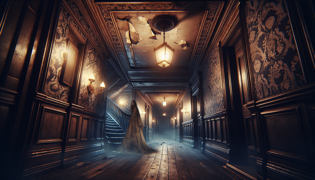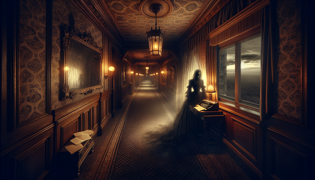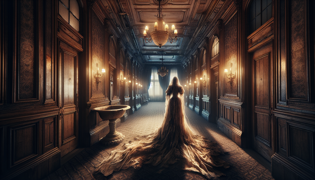Haunting at the Neils Hotel: A 19th Century Ghost Tale
Reading Time: 10 min

About Story: Haunting at the Neils Hotel: A 19th Century Ghost Tale is a Historical Fiction from united-states set in the 19th Century. This Dramatic tale explores themes of Good vs. Evil and is suitable for Adults. It offers Entertaining insights. A spectral presence lurks in the corridors of a historic American hotel.
Introduction
The winter wind skated through the elm trees outside Neils Hotel, its breath rattling the panes like fingernails on glass. Inside, the vast lobby lay under the glow of a single oil lamp, walls streaked with time’s sepia stain. Amelia Hart paused at the threshold, the threshold that had borne witness to weddings and farewells, fortunes and tragedies. She’d come to catalogue ledgers and letters, not to confront whispers in the gloom. But as the door creaked shut behind her, she felt a chill that wasn’t entirely of the draught.
She ran her fingers over the reception desk’s polished surface and caught the faint odour of musty leather—old registries and mothball memories. A faint drip of water echoed from somewhere beyond a corridor, like a metronome ticking out a ghostly refrain. She straightened her shawl, feeling the coarse wool scratch against her arm, and wondered if she was being childish to imagine a presence lurking just out of sight.
Yet she’d read the local rumour: a clerk who vanished a century ago, swallowed into the walls by some injustice and said to haunt these halls. Amelia didn’t believe in phantoms, but she’d always believed in wrongs left unatoned. As she lit a taper, its flame wobbling like a candle guttering in a gale, she realised she had more than documents to sort. There was a story here that couldn’t be filed away, a restless soul in need of reckoning. And so, girded by curiosity and a stubborn determination, she stepped further into Neils Hotel, unaware that its shadows were already watching her, keen and without mercy.
Shadows in the Foyer
Amelia moved through the foyer like a ghost in her own right, each footstep muffled by the threadbare carpet. The grand chandelier overhead hung ajar, crystals trembling with every breeze that seeped through draughty windows. She reached out to steady herself on a marble column, its surface surprisingly cold and smooth under her palm. Behind her, the ache of silence settled like a heavy cloak, and she half-expected to see footprints appearing in the dust. The air smelled faintly of damp wood and extinguished candles, as though someone had whispered a last prayer before vanishing into darkness.
She examined the guest registry on the front desk, its pages edged in golden filigree. Names were scrawled in inky loops—gentlefolk and drifters alike—each entry a heartbeat long since stilled. One name, crossed out in furious haste, caught her eye: E. Caldwell. The ink bled, as if the writer had used tears for ink. She leaned closer, the texture of the paper rough beneath her fingertips, and whispered, “Caldwell… who were you?” A hollow creak sounded behind her, like a heavy door opening, and she spun. Nothing but shadow greeted her. It was as silent as church mice.
Despite every rational bone in her body telling her this was ridiculous, she felt an itch at the back of her neck, as if unseen eyes were roaming her hair. She stole across the room, her gown whispering against the carpet. The fireplace at the far end lay cold, ashes long since settled. But upon the mantel, a solitary glove lay draped, pale as bone. She reached out and picked it up; the leather was stiff and dandruff-dusted. She could almost hear a soft sigh, as though the glove were pleading for some lost owner. It didn’t make no sense, yet the glove quivered in her grip. The lamp’s flame flickered, and in its wavering light she thought she saw a shape in the corner—a figure draped in Victorian finery, half-hidden by shadow. She blinked, and it was gone, leaving only the glove and the hush of unanswered questions.

Footfalls on the Staircase
The staircase spiralled upward like a serpent’s spine, each step polished to a dull sheen. Amelia placed her hand upon the banister, its wood warm from centuries of use yet marred by gouges and nickmarks. She climbed, each footfall echoing as though someone matched her step for step. A low moan drifted down the stairwell, and the distant chime of a grandfather clock tolled an hour that didn’t exist. The scent of heated iron and spilled wax lingered in the gloom, tickling her nostrils with a promise of dread.
Halfway up, she paused on a landing. The wallpaper here was peeling, revealing layers of crimson damask beneath a dingy floral print. She ran her finger along the torn edge; the paper crumbled like ash. Suddenly, a soft footstep sounded behind her—two, three steps—as though someone in dainty slippers followed her ascent. She swung around, heart hammering, but beheld only the empty corridor. The lantern she carried flickered, casting her own shadow large as a man’s, claws outstretched upon the wall.
She resumed, breath catching on each rise. At the top, the hallway stretched long, lined with numbered doors whose brass plates glinted dully. Room 13 seemed to stare at her, its door cracked open as though inviting her in. A rush of stale air rushed past her lips, smelling of cold stone and old perfume. She pressed an ear to the door and heard a heartbeat that wasn’t hers—a slow thump echoing through the planks. A tremor ran up her spine. She dared not retreat, nor advance, caught between curiosity and a primal fear as old as time itself. With a trembling hand, she nudged the door further ajar and peered into the gloom, where the candlelight danced across a chaise longue and an empty rocking chair, still as a graveyard monument.

The Forbidden Suite
Suite 13 had borne many names—some whispered, some sworn to secrecy. Locals called it The Hollow Room, for no guest ever checked in and left unchanged. The air here lay thick, as though the walls exhaled with every passing decade. Amelia hesitated at the threshold, feeling the floorboards protest under her weight. The door’s brass knocker hung unused, yet bore the shape of a heart pierced by a dagger. She pushed it open. Inside, the suite sprawled wide, paper-thin curtains stirring as though sighing. The daylight was barred; heavy drapes cocooned the room in a dusky half-light. She smelled cold marble and something fouler—like rot beneath varnish.
She ventured in, noticing a gilt-framed mirror propped against the far wall. Its glass was dulled, speckled with age, and reflected her own pale visage back at her. But in the drowned corners she swore she saw movement—shadows pooling, reaching. Her fingers trembled as she traced the intricate filigree of a writing desk set neatly near the window. Upon it lay a single sheet of paper, edges singed, ink smeared red—like blood. She knelt to read it, deciphering lines of anguish: “I beg forgiveness for the cruelty done. Release me.” The script trailed away, torn. She felt tears sting her eyes; never had she been so moved. The room seemed to exhale, as if relieved at having its burden recognised.
A sudden chill ran through her bones as footsteps marched behind her. She spun, clutching at her cloak, and beheld the spectre: a man in a linen duster, face pale as moonlight, eyes hollow quagmires of sorrow. His form wavered like mist, yet he was solid to her gaze. She could almost feel the rasp of his breath, hear the distant hoot of an owl beyond the walls. He pointed to the letter, and though his lips did not move, she heard the whisper: “Set me free.” Her heart thudded—she understood then that the hotel did not imprison him, but he imprisoned the hotel. Gathering courage like a shield, she vowed to right this ancient wrong, however fierce the path ahead might be.

Revelation in the Ballroom
The grand ballroom lay beyond a pair of ornately carved oak doors, their hinges rusted but intact. Amelia prised them open, revealing a vast chamber with a mirrored ceiling and a chandelier dripping crystal teardrops. Moonlight filtered through stained glass, painting the parquet floor in fractured jewel tones. The scent of old wine and dust told of countless revelries now silent. She stepped inside, her steps ringing like a funeral bell, and felt watched by portraits of suited figures whose eyes gleamed with remembered pride.
At the room’s centre stood a marble fountain, long dry, its basin clogged with fallen petals. Amelia climbed onto its edge, heart throbbing, and unfolded the burnt letter from her cloak. The spirit’s message now made sense: he had been wronged by the hotel’s founder, condemned on false charges and buried alive within these walls. His justice had turned to anger, and he’d bound himself—and the house—to eternal unrest. She read the lines aloud, voice quavering, invoking forgiveness and absolution. The echo returned to her, softened, as though the walls were listening.
A spectral wind gusted, ruffling her hair and rustling the taffeta drapes. The chandelier swayed, crystals chiming in a discordant melody. A silhouette formed by the fountain, spectral and resolute. The ghost of Edward Caldwell, no longer angry but resolved, stepped forward. The chandelier’s last crystal dropped, shattering like a hail of stars. He raised a hand, and Amelia felt warmth bloom in her chest—a promise kept. The cracks in the wallpaper behind him glowed faintly, as if sealing shut. Then, as silent as he had appeared, he faded, leaving the ballroom bathed in stillness, the scent of rosewater drifting where none had been before.
Amelia sank onto a chair draped in velvet, relishing the hush that followed. The hotel seemed lighter, relieved after a century’s burden. She stepped outside into the corridor, where the lantern flame gleamed steady. The shadows no longer writhed against the walls. She realised then that some hauntings insist only on justice, not vengeance. With a deep breath of cold night air, she descended the staircase, bearing a story that would finally rest alongside its vanished author.

Conclusion
By dawn, Neils Hotel awoke anew, its halls hushed of old grievances. Amelia emerged onto the porch, the crunch of frosted gravel beneath her boots sounding almost friendly. The smell of pine from the nearby woodlands drifted in, fresh and uncompromising. Inside, the ledger pages lay open, but the ink seemed lighter, as if freed from the weight of vengeance. She tucked the singed letter into her satchel, determined to deliver it to the descendants of the hotel’s founder and lay the spirit to rest.
A soft creak from the doorway made her glance back. For an instant, she thought she saw a figure in morning’s first light—a courteous bow, a fading smile. Then the corridor stood empty, but the hush felt kinder now, as if the building itself sighed with relief. She inhaled, feeling the coarse milling of her cloak brush her cheek, and stepped forward. The air carried the distant trill of birdsong, the world brushing off its night terrors like dew upon petals.
As she walked away, the hotel’s sign creaked gently above her, letters newly brightened by the sun. No longer would travellers whisper nervously of phantom footsteps or unseen eyes; instead, they might speak of a place where wrongs were mended, and the past found peace. Amelia paused at the gate, trailing a finger along its wrought‑iron curves, and smiled. Even the dimmest colour of sorrow can yield to the light of truth, like petals unfolding at daybreak. With one last look, she turned her back on Neils Hotel and continued her journey, leaving behind a story finally at rest and a spirit freed at last.

















